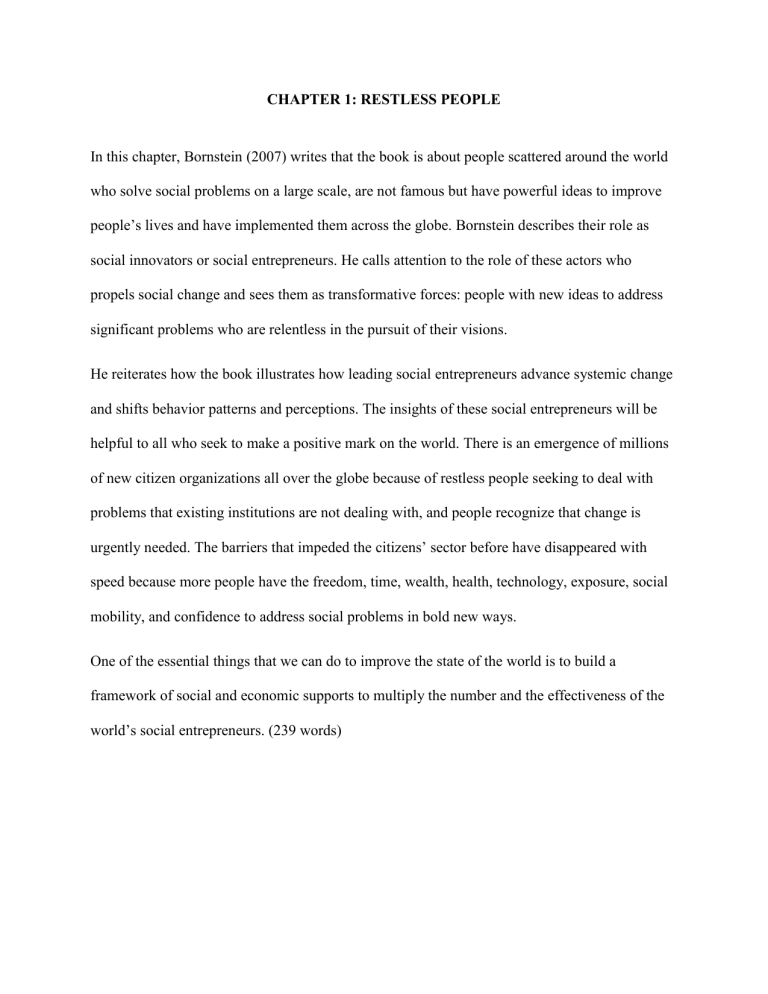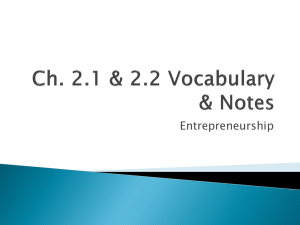
CHAPTER 1: RESTLESS PEOPLE In this chapter, Bornstein (2007) writes that the book is about people scattered around the world who solve social problems on a large scale, are not famous but have powerful ideas to improve people’s lives and have implemented them across the globe. Bornstein describes their role as social innovators or social entrepreneurs. He calls attention to the role of these actors who propels social change and sees them as transformative forces: people with new ideas to address significant problems who are relentless in the pursuit of their visions. He reiterates how the book illustrates how leading social entrepreneurs advance systemic change and shifts behavior patterns and perceptions. The insights of these social entrepreneurs will be helpful to all who seek to make a positive mark on the world. There is an emergence of millions of new citizen organizations all over the globe because of restless people seeking to deal with problems that existing institutions are not dealing with, and people recognize that change is urgently needed. The barriers that impeded the citizens’ sector before have disappeared with speed because more people have the freedom, time, wealth, health, technology, exposure, social mobility, and confidence to address social problems in bold new ways. One of the essential things that we can do to improve the state of the world is to build a framework of social and economic supports to multiply the number and the effectiveness of the world’s social entrepreneurs. (239 words) CHAPTER 2 – FROM LITTLE ACORNS DO GREAT TREES GROW Bornstein (2007) writes about Bill Drayton and his organization Ashoka: Innovators for the public and Gloria de Souza in this chapter. Bill Drayton established Ashoka in 1978 to support leading social entrepreneurs worldwide. He wanted to invest in people who have the passion, creativity, and determination to impact social change with new ideas on a large scale. He chose the oak tree as the logo of Ashoka partly because of the proverb, “From little acorns do great trees grow.” Ashoka began like a venture capital firm, seeking social entrepreneurs to provide high yields from modest, well-targeted investments. However, the returns are not profits but advances in education, environmental protection, rural development, poverty alleviation, human rights, healthcare, etc. In 28 years, Ashok had supported more than 1820 social entrepreneurs from 68 countries across the globe. Ashoka held its first selection panel in 1981; it elected Gloria de Souza as its first fellow. Gloria de Souza was a forty-five-year-old elementary school teacher in Bombay whose dream was to transform education across India. De Souza wanted to change India’s rote learning system to an experiential learning system because she believed the former was ineffective. Ashoka chose De Souza because of her ability to adapt this model to the Indian society and gave her a living stipend of $10,000 to cover four years to focus on the reformation of the Indian education system full time. By 1985, almost a million students and 1,700 schools were learning with Environmental Studies (EVS) approach that she introduced. (250 words) Reference Bornstein, D. (2007). How to change the world: Social entrepreneurs and the power of new ideas (Updated edition.). Oxford.


